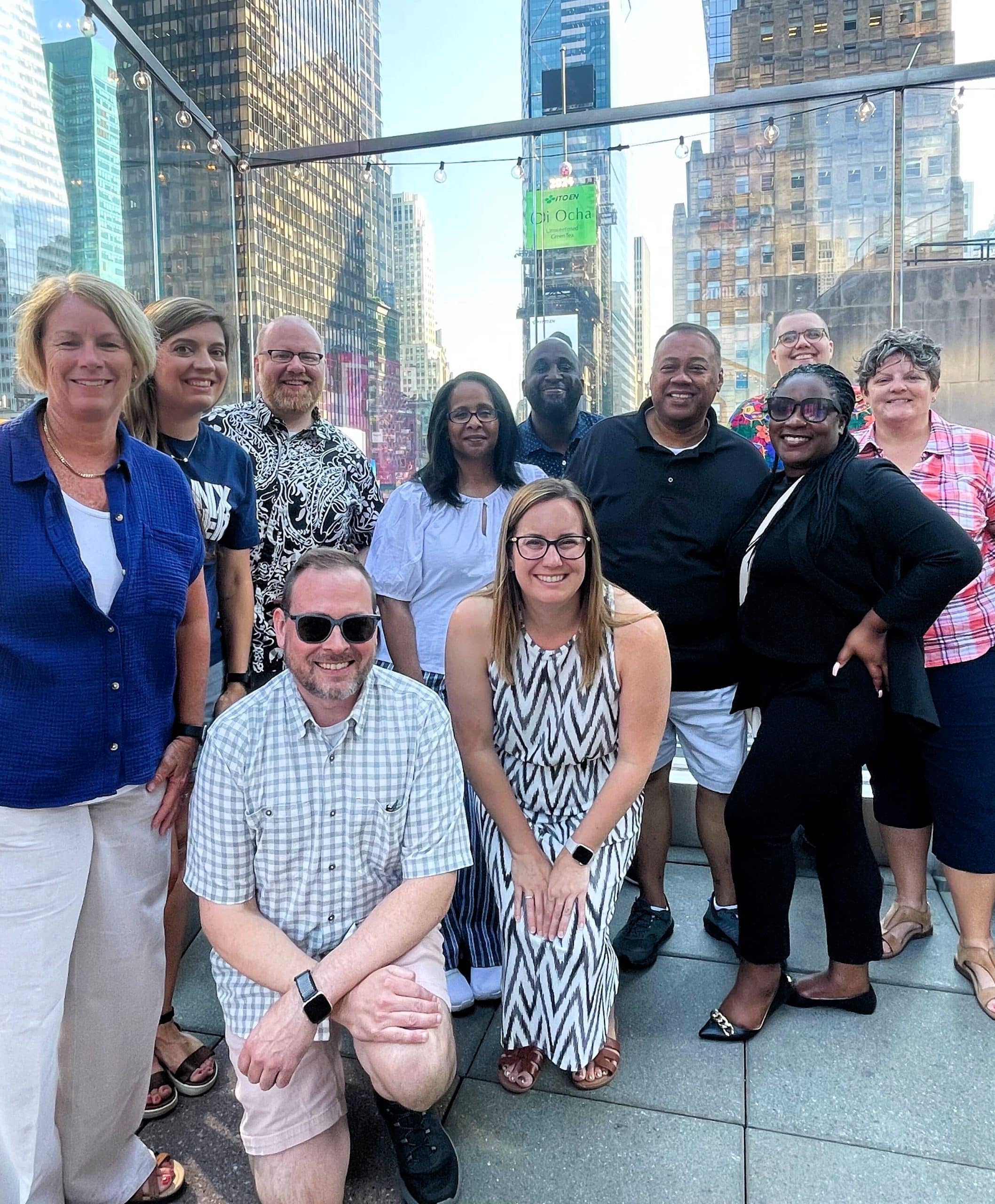Thank you to everyone who joined us in New York City for the 2025 ACUI Annual Conference, March 16–20!

The 2025 Conference Program Team created a meaningful and memorable experience in New York City, March 16–20. Through the planning process, the team was drawn to three main themes: Connecting, Innovating, and Big Ideas.
- Connecting: We want you to connect with each other, yourself, or and your work. We hope you’ll leave New York with a fuller heart than you came.
- Innovating: We look forward to providing an educational experience that’s world-class, following in the footsteps of the city, which is led by creativity and the idea that anything is possible.
- Big Ideas: New York is the Big Apple after all. We invite big ideas to be shared, so that when we leave, we’re ready to keep ourselves, our profession, and this Association moving forward.
It is our belief that guided by these themes and in partnership with our own ACUI Core Value, the team strived to create an impactful and meaningful Conference experience for everyone.
Conference by the Numbers
At the 2025 Annual Conference, the 882 total delegates were encouraged to make the most of the time in New York City, enjoying the following activities.
- 4 speakers at 3 all-conference sessions
- 120 educational sessions, including 8 extended sessions and 15 flash sessions, facilitated by 181 unique presenters
- 493 participants in 18 ACUI Adventure Experiences
- 389 registrants for 8 Regional Campus Visit and Dinner Experiences
- 224 registrants for 10 Offsite Tours
- 148 registrants for 8 Preconference Programs
- 358 sign-ups for 16 other socials and activities
- 66 sign-ups for onsite volunteer opportunities
Conference Resources
- Check out The Bulletin conference recap, featuring articles about ACUI President Ian Crone, Butts-Whiting Award Winner Brenda Evans, all-conference sessions, the ACUI Adventure, and much more!
- Attendees can now access all-conference sessions and submitted educational session materials in the revamped ACUI Resource Library (set drop down to 2025 Annual Conference).
- Browse the photo library to see more from the event.
All-Conference Sessions
To connect and inspire, the 2025 Annual Conference featured three all-conference sessions.
Opening Keynote: Rob Lawless
On a mission to spend one hour, 1-on-1, with 10,000 different people, Rob Lawless sees the world from an incredibly unique perspective. After earning a finance degree, working as a business analyst, and transitioning to a sales role at a venture-funded startup, he began to miss the authentic connection he’d experienced in college. As a result, he set off on a journey in November 2015 to meet 10,000 people for an hour each for no specific reason. The responses were overwhelmingly positive, and he began meeting people from incredibly diverse backgrounds. Lawless’s interactive and captivating keynote will take you through his incredible experience and share how making meaningful connections can drive growth and innovation within your organization.

Closing Keynote: Dr. Terrell Strayhorn
Dr. Terrell Strayhorn is a leading authority in the fields of education, psychology, and leadership—internationally known for his groundbreaking research and scholarship on sense of belonging. He currently serves as professor of education and psychology at Virginia Union University, where he also works as associate provost, interim dean of the School of Arts and Sciences, director of research in the Center for the Study of Historically Black Colleges and Universities (HBCUs), and principal investigator of the Belonging Matters Lab. Authoring over 12 books, more than 200 academic publications, and dozens of op-eds, letters, and blogs, Dr. Strayhorn has dedicated his career to working with individuals from diverse, vulnerable, and system-impacted backgrounds.

Monday All-Conference Session: ACUI Talks
Our Monday All-Conference Session will feature two speakers focused on resilience, learning, and determination. Anya Kamenetz is an award-winning former correspondent for National Public Radio with a passion for the complexities of how we learn, work, and live in a rapidly changing world. Mahogany Browne is a writer, playwright, organizer, and educator driven to rebuild communities and highlight diverse voices, currently serving as the inaugural poet-in-residence at Lincoln Center.
Journalist and author Anya Kamenetz is a futurist with a passion for the complexities of how we learn, work, and live in a rapidly changing world. An award-winning correspondent at NPR coordinating education coverage online and on air, her reporting has appeared in The Guardian, New York Magazine, The New York Times, Oprah’s “O” Magazine, Slate, The Village Voice, WIRED, The Washington Post, and many others. She’s covered learning, technology and educational transformation for two decades and in five books with a sense of empathy and a sense of humor.

Mahogany L. Browne, a Kennedy Center’s Next 50 fellow and MacDowell Arts Advocacy Awardee, is a writer, playwright, organizer, and educator. Browne received fellowships from All Arts, Arts for Justice, Air Serenbe, Baldwin for the Arts, Cave Canem, Hawthornden, Poets House, Mellon Research, Rauschenberg, Wesleyan University, and UCross. Browne’s books include “Vinyl Moon,” “Chlorine Sky,” “Black Girl Magic,” and banned books “Woke: A Young Poet’s Call to Justice” and “Woke Baby.” Founder of the diverse lit initiative Woke Baby Book Fair, Browne currently tours Chrome Valley and is the 2024 Paterson Poetry Prize winner. Browne holds an honorary Doctor of Philosophy degree awarded by Marymount Manhattan College and is the inaugural poet-in-residence at Lincoln Center.

All-conference sessions are sponsored by Gotham Artists.
Schedule
The 2025 Annual Conference will be full of opportunities to learn and connect as a community of professionals. Each day will feature a conference-wide experience—keynotes, talks, and adventure experiences. Following a wide range of preconference and tour programs, the event will start on Sunday, March 16, with welcome activities and keynote, regional meetings, an opening gathering, and special off-site regional campus visit and dinner experiences. Monday will include educational sessions, an all-conference sessions, and lunch at the opening of the ACUI Expo. Tuesday will feature educational sessions, the ACUI Expo, and the unique ACUI Adventure experiences in the afternoon. And Wednesday, March 19, will include educational sessions, the final keynote, and the annual closing banquet and celebration. Learn more about highlights from this year’s schedule below.
Registration
The 2025 Annual Conference offers valuable professional development opportunities included in your registration fee:
- 10 educational session blocks
- Three all-conference sessions
- Two times to discover product solutions from exhibitors
- One afternoon of unique learning adventures
Each day of the conference will feature multiple programs to facilitate attendees to connect as a community, discover innovative and creative practices, and be inspired by bid ideas through receptions, showcases, community gatherings, meals, and more. Full conference registration will include a light opening reception, a lunch in the ACUI Expo, and a dinner at the closing banquet. The cancellation policy for the event is available here.
Online registration is now closed. Please email acui@acui.org with any questions regarding registration.
EARLY REGISTRATION
(THROUGH DECEMBER 17)
- Professional Member: $825
- Professional Nonmember: $995
- Student Member: $425
- Student Nonmember: $525
- One-Day Member Registration: $325
- One-Day Nonmember Registration: $425
- Retiree Registration: $475
REGULAR REGISTRATION
(DECEMBER 18–FEBRUARY 6)
- Professional Member: $925
- Professional Nonmember: $1,095
- Student Member: $475
- Student Nonmember: $575
- One-Day Member Registration: $375
- One-Day Nonmember Registration: $475
- Retiree Registration: $475
LATE REGISTRATION
(AFTER FEBRUARY 6)
- Professional Member: $995
- Professional Nonmember: $1,195
- Student Member: $525
- Student Nonmember: $625
- One-Day Member Registration: $450
- One-Day Nonmember Registration: $550
- Retiree Registration: $475
Additional Registration Options
Interested in just attending one meal or joining us for the closing banquet? Email acui@acui.org to explore these options.
Seasoned Professionals & Retirees Homecoming (Wednesday Only) | Registration Fee: $275
Looking to reconnect with ACUI colleagues? Want to know what is happening with ACUI? Enticed by the opportunity to take advantage of the sights and sounds of New York City? The Seasoned Professionals and Retirees (SPAR) Community of Practice has planned an afternoon experience specifically designed for ACUI retirees. Seasoned professionals are welcome! The agenda will include an update on the state of ACUI, followed by educational sessions of interest to retirees, a cash bar social, and the traditional closing banquet. Make time to renew old friendships and reconnect with your professional organization!
Registration for this option includes access to sessions on Wednesday, light snacks at the social, and dinner at the closing banquet.
Wednesday, March 19:
- Noon–1 p.m. – Check-in
- 1–2:50 p.m. – All-Conference Session
- 3–3:50 p.m. – State of ACUI Session
- 4–4:50 p.m. – Educational Sessions
- 5–7 p.m. – Social (cash bar)
- 7–9 p.m. – Closing Banquet
You may also add a optional post-conference tour for Thursday, March 20.
Travel and Hotel
HOTEL
The core of all conference activities and lodging is at the New York Marriott Marquis at: 1535 Broadway, New York, NY 10036. After the hotel cutoff of February 11, the ACUI group room rate of $289 is no longer available.
If you have an existing reservation in the ACUI group block, you can manage you reservation here.
TRANSPORTATION
Three are major airport hubs serve New York City and are recommended for arranging your travel to the conference:
- LaGuardia Airport (LGA), located 8 miles from Midtown Manhattan in Queens
- John F. Kennedy International Airport (JFK), located 15 miles from Midtown Manhattan in Queens
- Newark Liberty International Airport (EWR), located 16 miles from Midtown Manhattan in New Jersey
Amtrak routes through New York Penn Station are also available to get you into Manhattan, just one mile from the New York Marriott Marquis.
Justification to Attend
To support your professional development requests to join us at the 2025 ACUI Annual Conference, here are a variety of resources that can be utilized. We have drafted two template letters with key information included that you can download and edit for your purposes. Please review all the information to ensure it is relevant to your situation, and feel free to remove or add details prior to submitting as part of a request at your institution.
As you consider participating in this meaningful networking and learning opportunity, the items below should help to clarify more information about the event details.
About the Conference
Registration
Meet the 2025 Conference Program Team
- Susan Canady, Chair, University of Maryland
- Sarah Aikman, Northern Kentucky University
- Alisha Campbell, University of Wisconsin–Milwaukee
- Mara Dahlgren, Indiana University
- Yakima Melton, Arizona State University
- Anthony Roberson, California State University–San Bernardino
- Martin Ryan, University of Limerick
- Stan Sweeney, Washington University in St. Louis
- Melissa Ulmer, Rowan University
- Julie Wagner, University of Michigan
- David Wilder, Middlebury College
- Justin Rudisille, ACUI Central Office


